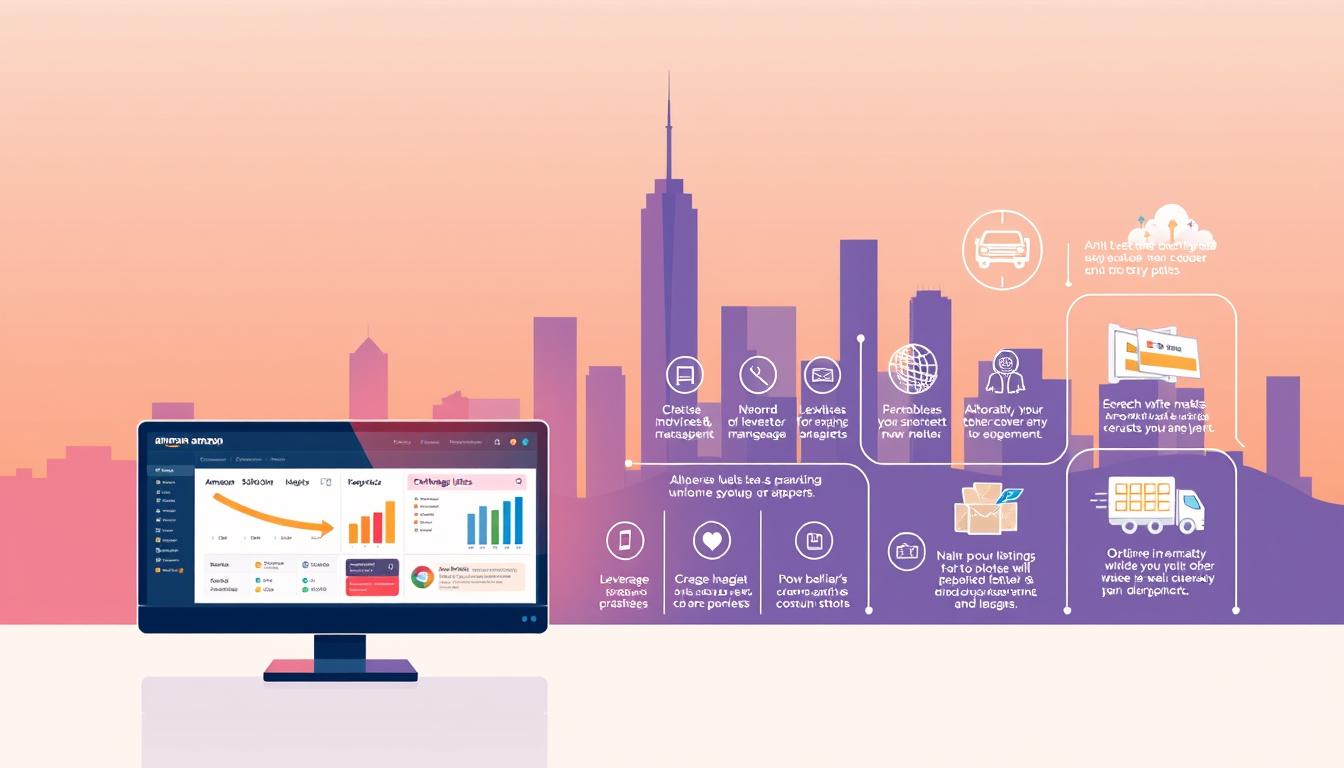Kolkata, India
Blog Details

Master Amazon Wholesale FBA/FBM: Tips & Strategies
Master Amazon Wholesale FBA/FBM: Tips & Strategies
Did you know thousands of sellers are using Amazon's vast marketplace to grow their businesses? They're doing it through the Wholesale Business Model. This model, paired with Amazon's Fulfillment by Amazon (FBA) or Fulfillment by Merchant (FBM) services, is a great chance for entrepreneurs to expand their operations.
To succeed in Amazon Wholesale FBA/FBM, you need to know the platform well. You also need smart strategies to stay ahead. In this article, we'll dive into the Wholesale Business Model on Amazon. We'll give you tips and strategies to boost your business.

Key Takeaways
- Understanding the basics of Amazon's Wholesale Business Model.
- Strategies for selecting profitable products.
- Tips for optimizing your Amazon listings.
- Effective inventory management techniques.
- Best practices for leveraging FBA or FBM.
Understanding Amazon Wholesale FBA/FBM Basics
To do well on Amazon, knowing the basics of Amazon Wholesale is key. This model means buying lots of products from suppliers and selling them on Amazon.
What is Amazon Wholesale?
Amazon Wholesale is a way to sell on Amazon by buying lots of products from suppliers. Sellers get better prices because they buy in bulk. This can help them make more money.
FBA vs. FBM: Key Differences
Fulfillment by Amazon (FBA) and Fulfillment by Merchant (FBM) are two ways to manage Amazon orders. FBA lets Amazon store and ship products. FBM means sellers handle everything themselves.
Fulfillment by Amazon (FBA) Explained
FBA offers Prime shipping, which can make products more visible and attract more buyers. Amazon also takes care of customer service and returns for FBA orders.
Fulfillment by Merchant (FBM) Explained
FBM lets sellers control their inventory and shipping. But, they must deal with customer service and returns on their own.
Benefits of Amazon Wholesale Business Model
The Amazon Wholesale model has many benefits. It can lead to higher profits because of bulk buying. It also uses Amazon's huge customer base. By knowing the FBA and FBM differences, sellers can pick the best option for their business.
Getting Started: Setting Up Your Amazon Seller Account
Starting your Amazon wholesale business begins with setting up your Amazon Seller Account. First, you must choose the right seller account type for your business.
Individual vs. Professional Seller Account
Amazon has two seller account options: Individual and Professional. The Individual account is perfect for those selling less than 20 items a month. It doesn't offer extra selling tools.
The Professional account is for serious sellers. It comes with advanced tools and reports.
| Features | Individual Account | Professional Account |
|---|---|---|
| Monthly Fee | $0 | $39.99 |
| Selling Plan | Pay-per-sale | Flat monthly fee |
| Additional Tools | Limited | Advanced selling tools and reports |
Account Verification Requirements
After picking your account type, you'll need to verify it. Amazon checks accounts to keep them secure and authentic.
Setting Up Tax Information
To sell on Amazon, you must set up your tax details. This includes getting a sales tax permit in states where you have nexus.
Sales Tax Collection
You'll need to know how to collect sales tax on your Amazon sales. Amazon offers tools to help with this.
State Nexus Considerations
https://www.youtube.com/watch?v=QMmFyj75-II
Finding Profitable Products for Amazon Wholesale
The success of an Amazon Wholesale business depends on picking the right products. To do this, sellers need to use good product research methods. This helps find items that make money.
Product Research Techniques
There are many ways to research products for Amazon Wholesale. Sellers can use special tools or do it by hand.
Using Product Research Tools
Product research tools make finding profitable products easier. They give insights into demand, competition, and sales rank.
- Use tools like Jungle Scout or Helium 10 to analyze product trends.
- Find products with high demand and less competition.
Manual Research Methods
Manual research means looking at Amazon's product listings and reviews.
- Look for products with lots of reviews and a steady sales rank.
- Check customer feedback for ways to improve the product.
Using Amazon's Best Seller Lists
Amazon's Best Seller lists are great for finding profitable products.
- Check Amazon's Best Seller lists for top-selling items.
- Use these lists to spot trends in what people want.
Evaluating Competition and Demand
To make sure a product is profitable, sellers need to check competition and demand.
Sales Rank Analysis
Looking at a product's sales rank helps understand its demand.
- Products with a low sales rank (e.g., below 100,000) are in high demand.
- Watch how the sales rank changes over time to see trends.
Profit Margin Calculations
It's important to calculate profit margins to make sure the product is worth it.
- Think about the product's cost, Amazon fees, and shipping costs.
- Use a profit margin calculator to make it easier.
By using these research methods, sellers can find profitable products for their Amazon Wholesale business.
Sourcing Products from Legitimate Suppliers
Finding good suppliers is key to a successful Amazon business. It affects the quality, price, and delivery of your products.
Finding Reputable Wholesalers
Use online wholesale directories to find reliable suppliers. Sites like SaleHoo, Worldwide Brands, and AliExpress are great resources.
Online Wholesale Directories
Directories make it easy to find suppliers. They offer supplier info, product lists, and reviews. This helps you choose wisely.
Manufacturer Direct Relationships
Talking directly to manufacturers can help. You can get better prices and a more reliable supply chain. Trade shows and events are good places to meet them.
Attending Trade Shows and Industry Events
Trade shows are great for meeting suppliers. You can see their professionalism and product quality. The Canton Fair and Las Vegas Market are good places to start.
Negotiating with Suppliers
Good negotiation is key. Look for volume discounts and favorable payment terms. A good relationship can lead to better deals.
Volume Discounts
Getting volume discounts can save you money. Suppliers often give discounts for big orders, which can boost your profits.
Payment Terms
Payment terms are important. Options like Net 30 or Net 60 can help with cash flow. Make sure you understand the terms before agreeing.

| Supplier Evaluation Criteria | Importance Level | Tips for Evaluation |
|---|---|---|
| Product Quality | High | Request samples, check reviews |
| Pricing | High | Compare prices, negotiate |
| Shipping Reliability | High | Check shipping times, track records |
| Customer Service | Medium | Test communication, response times |
Obtaining Brand Approval and Resale Certificates
Amazon's marketplace is complex, with rules for brand approval and resale certificates. To sell certain brands, sellers must follow Amazon's brand restrictions. This means getting brand approval and sometimes resale certificates.
Understanding Amazon's Brand Restrictions
Amazon has brand restrictions to protect intellectual property and ensure a good customer experience. Sellers need to know these rules to avoid account suspensions or product removals. Restricted brands often need approval before listing products.
How to Apply for Brand Approval
To get brand approval, sellers must follow Amazon's guidelines. This includes:
- Verifying their identity and business information
- Providing documents that prove they can sell the brand
- Following Amazon's brand approval process
Required Documentation
Sellers need specific documents, such as:
- Invoice from the supplier or manufacturer
- Authorization letter from the brand owner
- Business license
Approval Process Timeline
The approval time varies based on the application's complexity and Amazon's review. Sellers should expect a few days to weeks for approval.
Managing Resale Certificates by State
Resale certificates help sellers avoid sales tax on products for resale. The rules for resale certificates differ by state. Sellers must know the specific regulations in the states where they operate.
| State | Resale Certificate Requirement | Valid Period |
|---|---|---|
| California | Required | Indefinite |
| Texas | Required | Until cancelled |
| New York | Required | Until revoked |
Pricing Strategies for Maximum Profitability
To make more money on Amazon, sellers need good pricing strategies. They must know Amazon's fees, compare prices, and use repricing tools. This helps balance being competitive with making a profit.
Competitive Pricing Analysis
It's key to check how others price their products on Amazon. Look at similar items, see their prices, and find where you can offer something different. Knowing what others charge helps you price your items right.

Understanding Amazon's Fee Structure
Amazon has different fees that can affect your earnings. Knowing these fees is important for setting prices that help you make more money.
FBA Fees Breakdown
Fulfillment by Amazon (FBA) fees include storage, picking and packing, and shipping. Storage fees change with the season and how much you have. Picking and packing cost about $0.99 per item. Shipping fees depend on your item's weight and size.
FBM Cost Considerations
For sellers using Fulfillment by Merchant (FBM), costs are different. You pay for packaging, shipping, and handling. FBM lets you control shipping but needs careful planning for timely and affordable delivery.
Setting Minimum and Maximum Price Points
It's important to set both minimum and maximum prices. The minimum should cover your costs, including Amazon fees. The maximum should be competitive. Using repricing tools helps adjust prices as the market changes.
Repricing Tools and Strategies
Repricing tools change your prices automatically. They help you stay competitive. You can set rules to be the cheapest, match competitors, or keep a certain margin. These tools are key to making your pricing work best for you.
Inventory Management Best Practices
Managing inventory is key to a successful Amazon business. It lets sellers fill orders fast, avoid running out of stock, and cut down on too much stock. This leads to happier customers and lower costs.
Determining Optimal Inventory Levels
To find the best inventory levels, sellers should look at past sales, seasonal trends, and market demand. This helps them know how much stock to keep. They want enough to meet demand without having too much.
Using Inventory Management Software
Inventory management software makes managing stock easier. It gives real-time updates, automates reports, and predicts future needs. This is based on past data and trends.
Handling Seasonal Fluctuations
Seasonal changes in demand can affect stock levels. Sellers need to plan for these changes to avoid running out of stock during busy times.
Holiday Preparation
For holidays, sellers should stock up on popular items and expect more demand. They also need to restock quickly. Keeping an eye on sales data in real-time is key.
Managing Slow-Moving Inventory
Slow-moving inventory can waste money and increase storage costs. To handle this, sellers can offer deals, bundle products, and make product listings more appealing.
| Inventory Management Strategy | Description | Benefits |
|---|---|---|
| Historical Data Analysis | Analyzing past sales data to predict future demand | Accurate forecasting, reduced stockouts |
| Inventory Management Software | Using software to track and manage inventory levels | Real-time updates, automated reporting |
| Seasonal Demand Planning | Preparing for seasonal fluctuations in demand | Avoids stockouts, reduces overstocking |
By following these inventory management tips, Amazon sellers can work more efficiently, save money, and make customers happier.
Optimizing Your Amazon Wholesale FBA/FBM Operations
Running a successful Amazon Wholesale business needs good operational management. Sellers must work on making their operations better to increase profits.
Creating Efficient Workflows
Streamlining workflows is key to cutting costs and boosting productivity. This means:
- Setting up strong order processing systems for quick fulfillment.
- Using good inventory tracking methods to keep stock levels right.
Order Processing Systems
An efficient order system is vital for handling lots of orders. It cuts down on mistakes and makes customers happier.
Inventory Tracking Methods
Keeping track of inventory accurately is important for the right stock levels. It stops overstocking and understocking, saving money.
Automating Repetitive Tasks
Automation is key in making operations better by cutting down on manual work and errors. Sellers can automate tasks like:
- Inventory updates
- Order routing
- Reporting
Quality Control Measures
Having strict quality control is important for keeping high product standards and happy customers.
Product Inspection Protocols
Regular checks on products help find and fix quality problems before they reach customers.
Customer Feedback Management
Handling customer feedback well is key to understanding what customers want and improving products.
By focusing on these areas, Amazon Wholesale sellers can greatly improve their operations and business success.
Shipping and Logistics Strategies
For Amazon sellers, shipping and logistics are key. They help deliver products on time and save money. A good plan keeps customers happy and sellers performing well.
Preparing Products for FBA Warehouses
To get products ready for FBA warehouses, sellers must follow Amazon's rules. This means using the right labels and packaging.
Labeling Requirements
- Use Amazon-approved labels
- Ensure labels are correctly placed on products and packaging
- Comply with Amazon's barcode requirements
Packaging Guidelines
Amazon has specific rules for packaging to protect products during shipping. Sellers should use strong materials and follow these guidelines.
Managing FBM Shipping Options
For FBM sellers, picking the right shipping options is important. This means choosing reliable carriers and making sure products arrive on time.
International Shipping Considerations
Shipping internationally requires sellers to know customs and import rules. They also need to plan for entering global markets.
Customs and Import Regulations
It's vital to understand and follow customs and import rules for smooth international shipping.
Global Marketplace Expansion
Expanding globally needs careful research and planning. Sellers must consider local demand and shipping logistics.
Scaling Your Amazon Wholesale Business
To grow your Amazon Wholesale business, focus on strategies that scale. This means reinvesting profits, expanding your product range, and building a strong team.
Reinvesting Profits for Growth
Reinvesting profits is key to scaling your business. It lets you grow, improve marketing, and offer better products. Use some of your profits to:
- Enhance your product listings with high-quality images and detailed descriptions
- Invest in targeted advertising to reach a broader audience
- Improve your inventory management systems for better efficiency
Expanding Your Product Catalog
Expanding your product range is vital for growth. You can do this by:
Category Diversification
Exploring new product categories can open up new markets. Look for trends and find areas that match your strengths.
Brand Relationship Development
Building strong brand relationships can give you exclusive deals and better prices. Attend trade shows and events to meet brand reps and negotiate.
Building a Team for Larger Operations
As your business grows, you'll need a team to handle more work. This means:
Key Roles to Fill First
Start by hiring people for critical tasks like inventory management, customer service, and marketing.
Outsourcing vs. In-house Staffing
Choose whether to outsource or hire staff based on your needs and budget. Outsourcing can save money on tasks like accounting and customer service. But, in-house staff is better for core business functions.
| Scaling Strategy | Benefits | Implementation Tips |
|---|---|---|
| Reinvesting Profits | Increased marketing reach, improved product offerings | Allocate a portion of profits to specific areas like advertising and inventory management |
| Expanding Product Catalog | Access to new markets, reduced dependence on single products | Research trending categories and build brand relationships |
| Building a Team | Better workload management, specialized skills | Hire for key roles first, consider outsourcing for non-core tasks |

Avoiding Common Amazon Wholesale Pitfalls
Success in Amazon Wholesale depends on avoiding big mistakes. These mistakes can cause account suspension or financial trouble. Amazon has strict rules, and sellers must follow them to keep their accounts safe.
Account Suspension Risks
Account suspension is a big risk for Amazon Wholesale sellers. To stay safe, sellers need to know Amazon's rules well. They must make sure they follow them.
Policy Violations to Avoid
Some common mistakes include selling fake products, faking reviews, and not being honest about products. Sellers should check Amazon's rules often. This helps them stay out of trouble.
Account Health Monitoring
Keeping an eye on account health is key. Sellers should watch their performance, like order defect rates and customer feedback. This helps spot and fix problems early.
Inventory Management Mistakes
Managing inventory well is very important. It helps avoid having too much or too little stock. Using inventory software helps track stock and improve supply chain.
Cash Flow Challenges
Managing cash flow is essential for keeping an Amazon Wholesale business alive. Sellers must balance the costs of inventory, shipping, and Amazon fees with their income.
Working Capital Management
Having enough working capital is key to cover costs. Sellers should manage their money well to avoid running out of cash.
Financing Options for Growth
To grow, sellers might need to look into financing. This could be loans or investors to buy more inventory or expand.
Conclusion
To succeed in Amazon Wholesale FBA/FBM, you need a solid plan and efficient operations. Understanding Amazon Wholesale basics and using the tips from this article can help. This way, sellers can aim for success.
Business Growth comes from finding profitable products and working with reliable suppliers. Managing your inventory well is also key. By setting competitive prices and optimizing your operations, you can make more money and stay competitive.
Keep your focus sharp as you grow your Amazon Wholesale FBA/FBM business. Avoid common mistakes and stay ready for market changes. With dedication and smart strategies, you can achieve lasting success and grow your business.
FAQ
What is Amazon Wholesale FBA/FBM?
Amazon Wholesale FBA/FBM lets sellers buy lots of products and sell them on Amazon. They can use Amazon's services (FBA) or handle it themselves (FBM).
What are the benefits of using Amazon FBA?
Amazon FBA offers fast and trusted shipping. It also gives customer service support. Plus, you get access to Amazon Prime customers, boosting sales and satisfaction.
How do I find profitable products for Amazon Wholesale?
Use product research tools to find good products. Look at Amazon's Best Seller lists. Analyze sales ranks and profit margins to see demand and competition.
What is the difference between Individual and Professional Seller Accounts on Amazon?
Individual Accounts are for small sellers with less than 40 items a month. Professional Accounts are for bigger sellers. They offer more features but cost a monthly fee.
How do I manage inventory levels effectively on Amazon?
Use inventory software to keep track of stock. Watch sales trends and adjust stock levels. Also, think about seasonal changes and how long it takes to get stock from suppliers.
What are the key considerations for international shipping on Amazon?
When shipping abroad, remember customs and import rules. Also, think about duties, taxes, Amazon's policies, and what they require for international sellers.
How can I avoid account suspension on Amazon?
Follow Amazon's rules to avoid suspension. Keep an eye on your account health. Quickly solve any customer problems or complaints.
What are the benefits of obtaining brand approval on Amazon?
Getting brand approval lets you sell branded items. It builds trust with customers. It also lowers the risk of account suspension for copyright issues.
How do I optimize my Amazon listings for maximum visibility?
Use the right keywords and high-quality images in your listings. Write detailed descriptions. Make sure your product is in the right category and priced right.
What are the best practices for managing cash flow as an Amazon seller?
Keep an eye on your sales and costs. Have a cash reserve. Look into financing options. Also, price your items well and manage your stock effectively.
How can I scale my Amazon Wholesale business?
Invest your profits to grow. Add more products to your catalog. Build a team. Consider hiring staff to handle more work.
What are the common mistakes to avoid in Amazon Wholesale?
Avoid bad inventory management and poor cash flow handling. Don't ignore Amazon's rules. Also, don't forget about customer service and feedback.





Send Inquiry